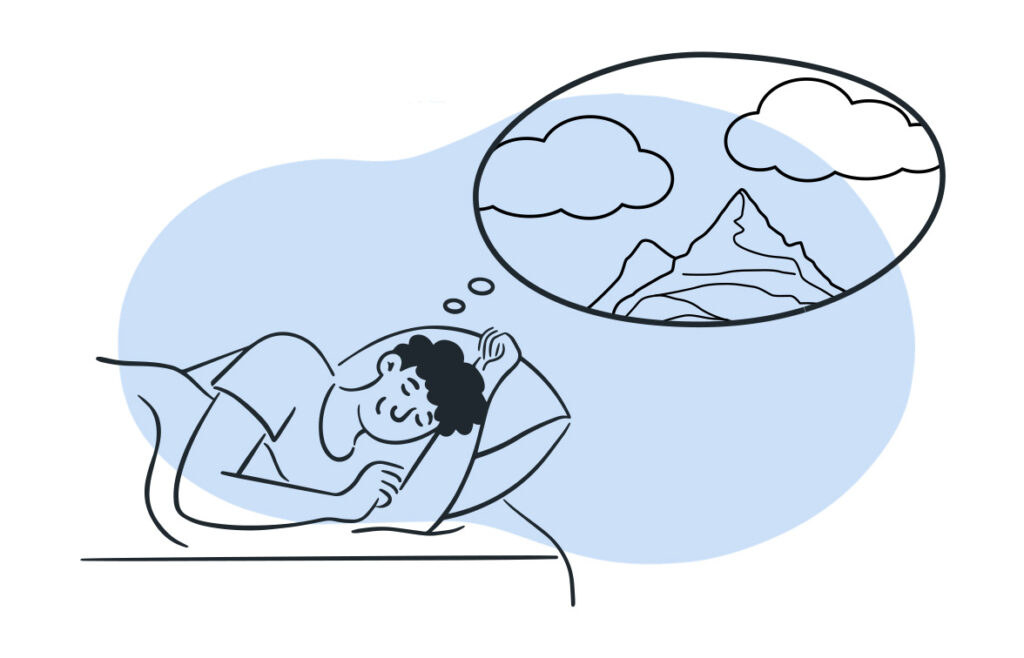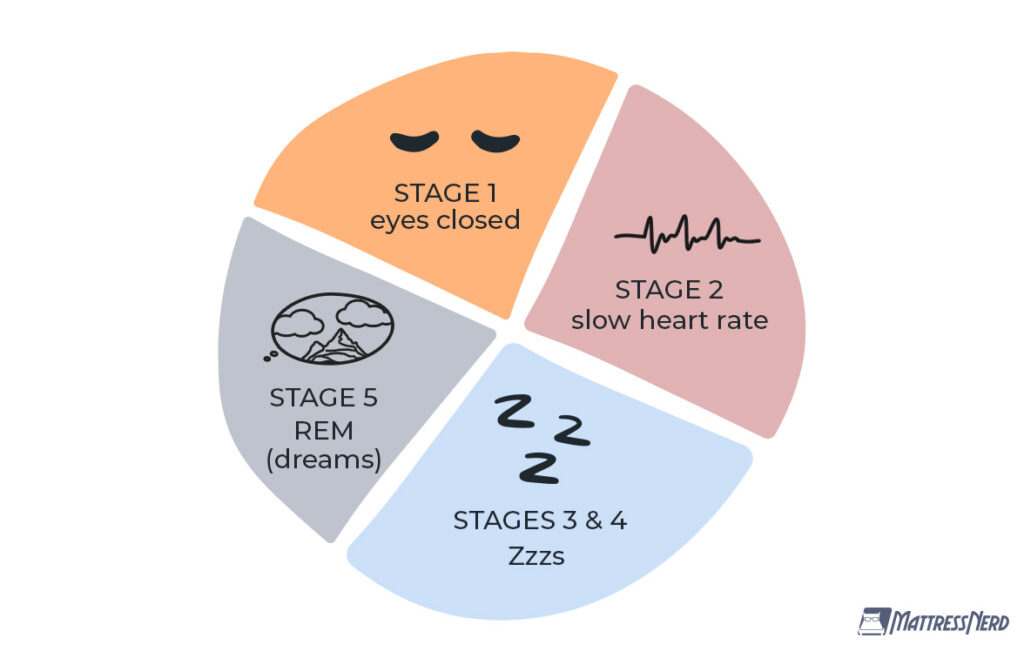Why Do We Dream?
Disclosure: By clicking on the product links in this article, Mattress Nerd may receive a commission fee at no cost to you, the reader. Read full disclosure statement.
Flying over the ocean, narrowly escaping being eaten by a shark, or realizing you’re in public, fully nude—dreams can be vivid and bizarre. While science (and the rest of us) agree that dreaming about fantastical happenings is totally normal, we can’t quite pin down the point of it.
Whether we view them as predictive of the future, a reflection of our subconscious thoughts, or just another product of a good night’s sleep, dreams have always fascinated us.
Scientists don’t have all the answers yet, but some progress has been made in understanding the function and meaning of dreams. So why do we dream? Let’s explore some of the theories.

What Are Dreams?
According to some scientists, dreams are simply “mental imagery or activity” that happen when you’re deep in snoozeville. This means that they can encompass everything from thoughts and memories to made-up scenarios and random nonsense.
While the definition of a dream might seem pretty simple, the actual cause is still very much up for debate. Some scientists believe that they help us mentally prepare for potential future threats, while others claim their primary function is to aid in our cognitive development.
Others believe that dreaming is simply a side effect of sleep—the brain’s offline way of sorting through memories and processing information from the day.
No matter the reason, it’s clear that dreams are a totally normal part of human existence. Even if you don’t recall a single detail, pretty much everyone is thought to dream between three and six times per night.
When Do Dreams Happen?
You might not be cognitively aware of it, but your body and brain transition through five different stages of sleep every night: wake, N1, N2, N3 (which are all non-rapid eye movement sleep), and REM (rapid eye movement sleep).
Technically, dreams can occur during any stage, but you’re most likely to have those vivid, story-like dreams during REM sleep.
How Long Do Dreams Last?
While it may seem like that dream about being chased by a clown lasted all night long, most dreams only last for a brief period of time. The National Institute of Neurological Disorders and Stroke estimates that we might spend as much as two hours dreaming each night—but how many times we dream and how long they last is still inconclusive.
Researchers have started using brain scans to study dream activity, but it’s still difficult to know exactly what’s going on in someone’s head while they’re asleep. While one person might report a long, vivid dream, in reality, it might only last for a few minutes.

How Do Dreams Impact Health?
How Do Dreams Affect Sleep?
Having intense, vivid dreams shouldn’t impact your sleep quality—as long as they’re not jolting you awake on a regular basis.
If your dreams are frightening—we’re looking at you, nightmares—then your sleep quality may be at risk. Frequent, ongoing nightmares that regularly wake us up can lead to insomnia and even a rare nightmare disorder. The occasional bad dream is nothing to worry about, but if you’re dealing with chronic nightmares or insomnia, talk with your doctor about treatment options.
What Influences Dreams?
Unsurprisingly, what we do and experience in our waking lives influences the content of our dreams. Research shows that almost half of the people we dream about are people we know, and the majority of our dreams are autobiographical in nature.
There’s even some evidence that eating dairy or spicy dishes close to bed can cause your dreams to be more disturbing and bizarre—though more research is needed to validate this possible link.
Of course, your mental health has a huge impact on your dreams. Research has found that whether you feel peace of mind or anxiety during the day can determine the tone of your dreams at night.
And oddly enough, the less sleep you get, the greater your brain activity is when you’re sleeping. Because your brain prioritizes REM sleep when you’re sleep-deprived, you might actually have more nonsensical dreams when you’re running on empty.

Different Types Of Dreams
Like snowflakes, every dream is different. And while some might be wilder than others, all dreams may offer a glimpse into our subconscious mind. Here are some of the most common types of dreams and what some of the most popular dream experts believe they mean:
- Falling: Dream analyst Lauri Quinn Loewenberg claims that falling is a sign of a major life problem. Be it work, school, or your personal life, she says this dream is a “red flag from your subconscious.”
- Losing teeth: There are a lot of mixed interpretations from popular dream analysts on what losing your pearly whites might mean. Some say it’s a sign of confidence and others believe it to be a bad omen about a romantic relationship.
- Public nudity: Dream psychologist Ian Wallace believes that showing up to work or school in the buff reveals how vulnerable you’re feeling in your waking life. According to his research, this dream often happens to those who just got a promotion or new job.
How To Remember Your Dreams
It’s not easy to remember all the comings and goings of your subconscious mind. But there are a few things you can do to increase the likelihood that you’ll remember your dreams when you wake up:
- Dream journaling: Keep a pad and pencil next to your bed and write down everything you remember the moment you wake up.
- Get more sleep: Some research suggests that getting more REM sleep and waking up later than your usual wake-up time increases the chances of remembering your dreams.
- Wake up slowly: Don’t jump out of bed immediately. Instead, try to slowly wake up and allow yourself to drift in and out of sleep a bit.
Final Thoughts
Dreams are a normal part of sleep that can offer insight into our subconscious mind. Although we don’t yet fully understand why we have them, we do know that they’re a healthy part of a good night’s sleep. So if you want to be a more active participant in your dream life, make sure to get plenty of rest and keep a journal by your bed.
Sources
Breus M. (2015). Why We Dream What We Dream. https://www.psychologytoday.com/us/blog/sleep-newzzz/201501/why-we-dream-what-we-dream
Breus M. (2019). 6 Steps to Help You Remember Your Dreams. https://www.psychologytoday.com/us/blog/sleep-newzzz/201907/6-steps-help-you-remember-your-dreams
Carr M. (2015). Do Certain Foods Really Cause Bad Dreams? https://www.psychologytoday.com/us/blog/dream-factory/201501/do-certain-foods-really-cause-bad-dreams
Cleveland Clinic. (2022). What Do Dreams Mean? https://health.clevelandclinic.org/dreams-and-dreaming/
Erlacher D, et al. (2014). Time for actions in lucid dreams: Effects of task modality, length, and complexity. https://pubmed.ncbi.nlm.nih.gov/24474942/
Khan D, et al. (2008). Dreaming and waking consciousness: a character recognition study. https://onlinelibrary.wiley.com/doi/full/10.1046/j.1365-2869.2000.00213.x#b2
Malinowski J, et al. (2014). Memory sources of dreams: the incorporation of autobiographical rather than episodic experiences. https://pubmed.ncbi.nlm.nih.gov/24635722/
Mayo Clinic. (2021). Nightmare disorder: Symptoms & causes. https://www.mayoclinic.org/diseases-conditions/nightmare-disorder/symptoms-causes/syc-20353515
Medrano-Martínez P, et al. (2014). [Generation and functions of dreams]. https://pubmed.ncbi.nlm.nih.gov/25297479/
National Institute of Neurological Disorders and Stroke. (2022). Brain Basics: Understanding Sleep. https://www.ninds.nih.gov/health-information/public-education/brain-basics/brain-basics-understanding-sleep
Nicholson C. (2007). Strange but True: Less Sleep Means More Dreams. https://www.scientificamerican.com/article/strange-but-true-less-sleep-means-more-dreams/
Nir Y, et al. (2011). Dreaming and the brain: from phenomenology to neurophysiology. https://www.ncbi.nlm.nih.gov/pmc/articles/PMC2814941/
Pace-Schott E, et al. (2013). Dreaming as a story-telling instinct. https://www.ncbi.nlm.nih.gov/pmc/articles/PMC3613603/
Patel A, et al. (2022). Physiology, Sleep Stages. https://www.ncbi.nlm.nih.gov/books/NBK526132/
Paul F, et al. (2015). Nightmares affect the experience of sleep quality but not sleep architecture: an ambulatory polysomnographic study. https://www.ncbi.nlm.nih.gov/pmc/articles/PMC4579510/
Sikka P, et al. (2018). Peace of mind and anxiety in the waking state are related to the affective content of dreams. https://www.ncbi.nlm.nih.gov/pmc/articles/PMC6109051/
Valli K, et al. (2005). The threat simulation theory of the evolutionary function of dreaming: Evidence from dreams of traumatized children. https://pubmed.ncbi.nlm.nih.gov/15766897/